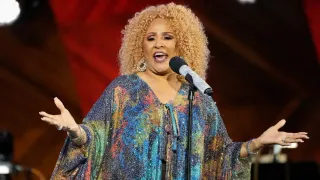Jan 1
Transgender Trailblazer Sarah McBride Heads to her Debut in Congress, Hoping for a Touch of Grace
Tiffany Stanley READ TIME: 8 MIN.
Early promise and a meteoric rise
Growing up in Wilmington, McBride was the type of child who practiced Democratic political speeches in her bedroom at a makeshift podium.
By high school, she had worked on multiple campaigns, including that of Beau Biden, the president's late son and former Delaware attorney general.
"She combines a passion for public service with a great intellect, with extraordinary political judgment and messaging ability," said Jack Markell, the U.S. ambassador to Italy, a former Delaware governor and McBride's mentor.
Though she seemed destined to work in politics, McBride once felt revealing her gender identity would derail those ambitions.
She was 21 and the president of American University's student government when she came out as transgender, first to her friends and family and later in a public post that went viral.
Sitting in her Wilmington condo, McBride said, "Coming out was without question the hardest thing that I had ever done up until that point. And yet it was still relatively easy compared to the experiences of so many people."
Her parents have been her biggest supporters, but they worried for her. One of their first calls after McBride came out was to their pastor, the Rev. Gregory Knox Jones of Westminster Presbyterian, a progressive church where Sarah was a youth elder and Jill Biden is a member.
"We talked about the fact that this was your child. You love your child," Jones recalled. "You can't think of losing a son. You've gained a daughter."
David McBride, Sarah's father, said that kind of support has made all the difference for their family. "Our life and Sarah's life have been made by the response that we and she got first from our friends, our church, our community."
McBride would go on to forge a trail through a rapid series of firsts. During college, she became the first openly transgender woman to intern at the White House. At a reception there, she met and later fell in love with a young lawyer, Andrew Cray, a trans man and LGBTQ+ health policy advocate.
As an activist at 22, McBride was instrumental in helping pass a transgender nondiscrimination law in Delaware. She worked as the spokesperson for the Human Rights Campaign, a leading LGBTQ-rights group. In 2016, she became the first openly trans person to speak at the Democratic National Convention.
To be a first, a historic first, is a privilege and a burden. McBride is quick to point out that she's more than just the headlines about her gender identity.
"The reality is that I didn't run to be a first. I didn't run to make history with an election," she said.
Her focus is to be the best member of Congress she can be for all of Delaware and the country.
It's the "only way that I can guarantee that while I may be a first, I'm not the last."






